Employee Relations: Impact of TUC on Workplace Equality and Diversity
VerifiedAdded on 2021/04/21
|8
|2020
|53
Report
AI Summary
This report provides an in-depth analysis of the impact of the Trade Union Congress (TUC) and other trade unions on employee relations, with a specific focus on their initiatives to support equality and diversity in the workplace. The report highlights the legal framework established by the Equality Act 2010, which protects workers from unfair treatment based on various characteristics. It explores how TUC initiatives, such as the promotion of equal opportunities and the representation of disadvantaged workers, have led to positive outcomes, including equitable pay rates and the protection of employees from discrimination and harassment. The report also discusses specific areas of focus, such as disability, gender identity, and equal pay, and how the TUC has provided guidance and support to ensure fair treatment and create successful working environments for all staff. Furthermore, the report emphasizes the positive impact of these initiatives on employers, including the attraction and retention of top talent, increased creativity, and a more ethical and productive workplace culture.

RUNNING HEAD: Employee Relations
Employee Relations
Employee Relations
Paraphrase This Document
Need a fresh take? Get an instant paraphrase of this document with our AI Paraphraser
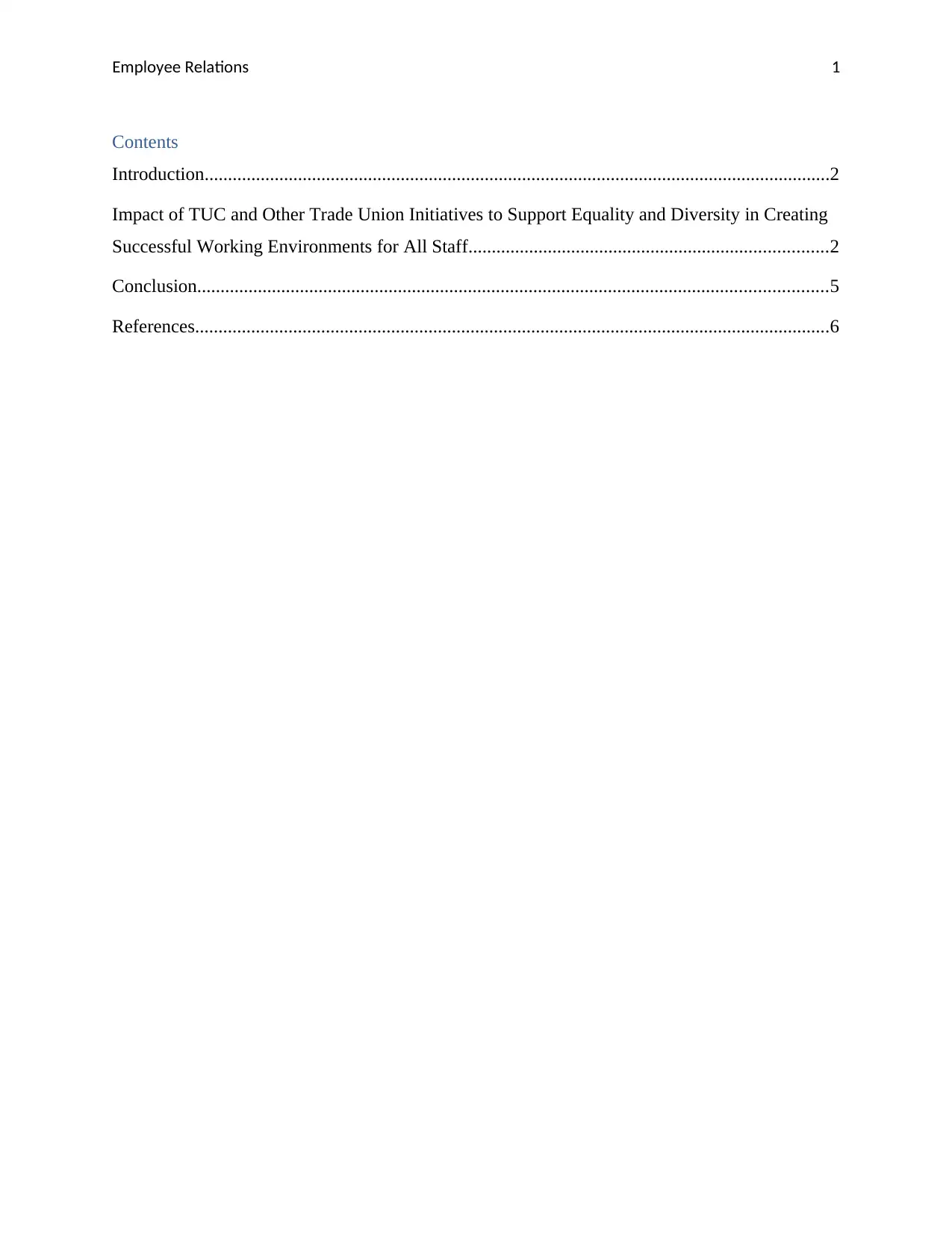
Employee Relations 1
Contents
Introduction......................................................................................................................................2
Impact of TUC and Other Trade Union Initiatives to Support Equality and Diversity in Creating
Successful Working Environments for All Staff.............................................................................2
Conclusion.......................................................................................................................................5
References........................................................................................................................................6
Contents
Introduction......................................................................................................................................2
Impact of TUC and Other Trade Union Initiatives to Support Equality and Diversity in Creating
Successful Working Environments for All Staff.............................................................................2
Conclusion.......................................................................................................................................5
References........................................................................................................................................6
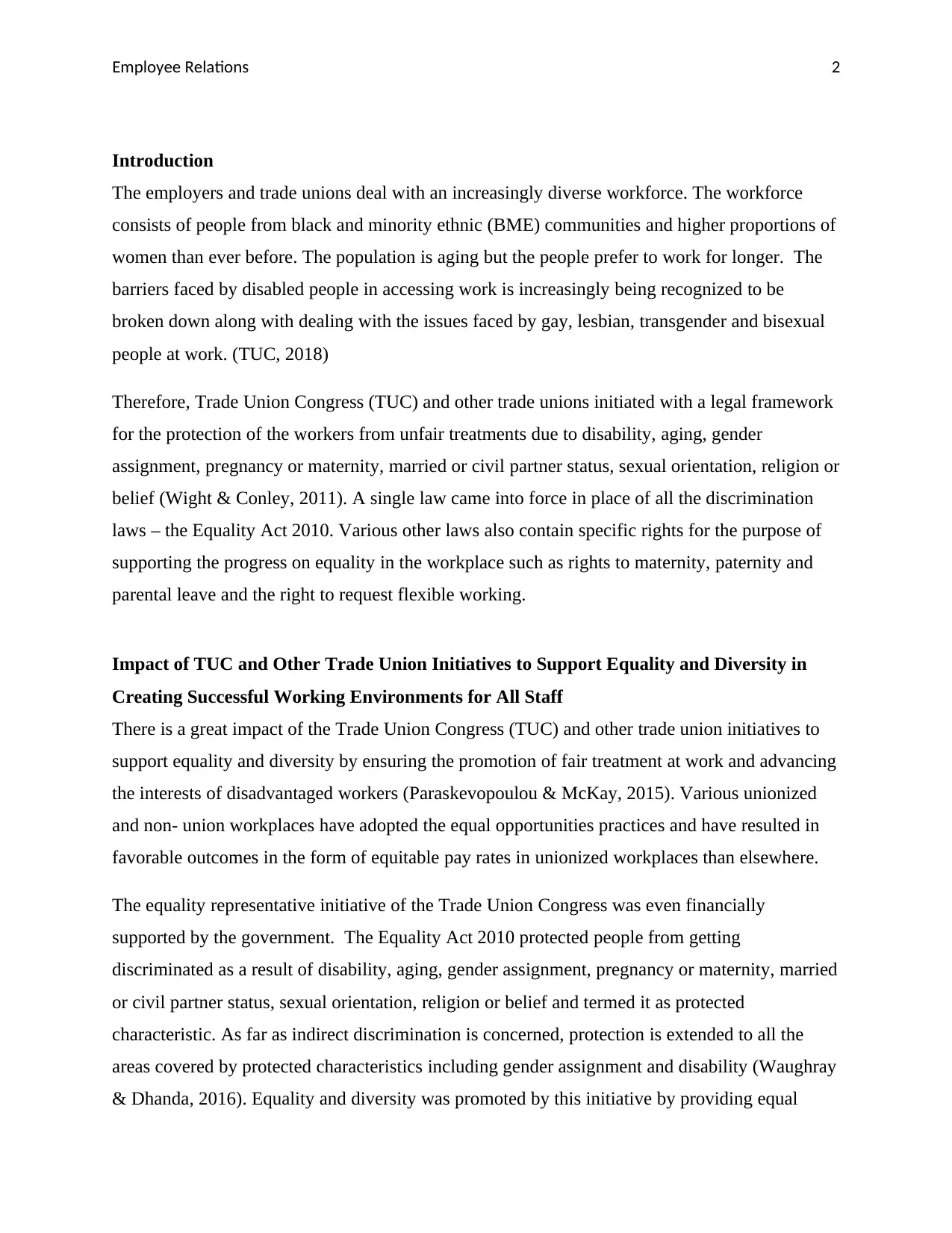
Employee Relations 2
Introduction
The employers and trade unions deal with an increasingly diverse workforce. The workforce
consists of people from black and minority ethnic (BME) communities and higher proportions of
women than ever before. The population is aging but the people prefer to work for longer. The
barriers faced by disabled people in accessing work is increasingly being recognized to be
broken down along with dealing with the issues faced by gay, lesbian, transgender and bisexual
people at work. (TUC, 2018)
Therefore, Trade Union Congress (TUC) and other trade unions initiated with a legal framework
for the protection of the workers from unfair treatments due to disability, aging, gender
assignment, pregnancy or maternity, married or civil partner status, sexual orientation, religion or
belief (Wight & Conley, 2011). A single law came into force in place of all the discrimination
laws – the Equality Act 2010. Various other laws also contain specific rights for the purpose of
supporting the progress on equality in the workplace such as rights to maternity, paternity and
parental leave and the right to request flexible working.
Impact of TUC and Other Trade Union Initiatives to Support Equality and Diversity in
Creating Successful Working Environments for All Staff
There is a great impact of the Trade Union Congress (TUC) and other trade union initiatives to
support equality and diversity by ensuring the promotion of fair treatment at work and advancing
the interests of disadvantaged workers (Paraskevopoulou & McKay, 2015). Various unionized
and non- union workplaces have adopted the equal opportunities practices and have resulted in
favorable outcomes in the form of equitable pay rates in unionized workplaces than elsewhere.
The equality representative initiative of the Trade Union Congress was even financially
supported by the government. The Equality Act 2010 protected people from getting
discriminated as a result of disability, aging, gender assignment, pregnancy or maternity, married
or civil partner status, sexual orientation, religion or belief and termed it as protected
characteristic. As far as indirect discrimination is concerned, protection is extended to all the
areas covered by protected characteristics including gender assignment and disability (Waughray
& Dhanda, 2016). Equality and diversity was promoted by this initiative by providing equal
Introduction
The employers and trade unions deal with an increasingly diverse workforce. The workforce
consists of people from black and minority ethnic (BME) communities and higher proportions of
women than ever before. The population is aging but the people prefer to work for longer. The
barriers faced by disabled people in accessing work is increasingly being recognized to be
broken down along with dealing with the issues faced by gay, lesbian, transgender and bisexual
people at work. (TUC, 2018)
Therefore, Trade Union Congress (TUC) and other trade unions initiated with a legal framework
for the protection of the workers from unfair treatments due to disability, aging, gender
assignment, pregnancy or maternity, married or civil partner status, sexual orientation, religion or
belief (Wight & Conley, 2011). A single law came into force in place of all the discrimination
laws – the Equality Act 2010. Various other laws also contain specific rights for the purpose of
supporting the progress on equality in the workplace such as rights to maternity, paternity and
parental leave and the right to request flexible working.
Impact of TUC and Other Trade Union Initiatives to Support Equality and Diversity in
Creating Successful Working Environments for All Staff
There is a great impact of the Trade Union Congress (TUC) and other trade union initiatives to
support equality and diversity by ensuring the promotion of fair treatment at work and advancing
the interests of disadvantaged workers (Paraskevopoulou & McKay, 2015). Various unionized
and non- union workplaces have adopted the equal opportunities practices and have resulted in
favorable outcomes in the form of equitable pay rates in unionized workplaces than elsewhere.
The equality representative initiative of the Trade Union Congress was even financially
supported by the government. The Equality Act 2010 protected people from getting
discriminated as a result of disability, aging, gender assignment, pregnancy or maternity, married
or civil partner status, sexual orientation, religion or belief and termed it as protected
characteristic. As far as indirect discrimination is concerned, protection is extended to all the
areas covered by protected characteristics including gender assignment and disability (Waughray
& Dhanda, 2016). Equality and diversity was promoted by this initiative by providing equal
⊘ This is a preview!⊘
Do you want full access?
Subscribe today to unlock all pages.

Trusted by 1+ million students worldwide
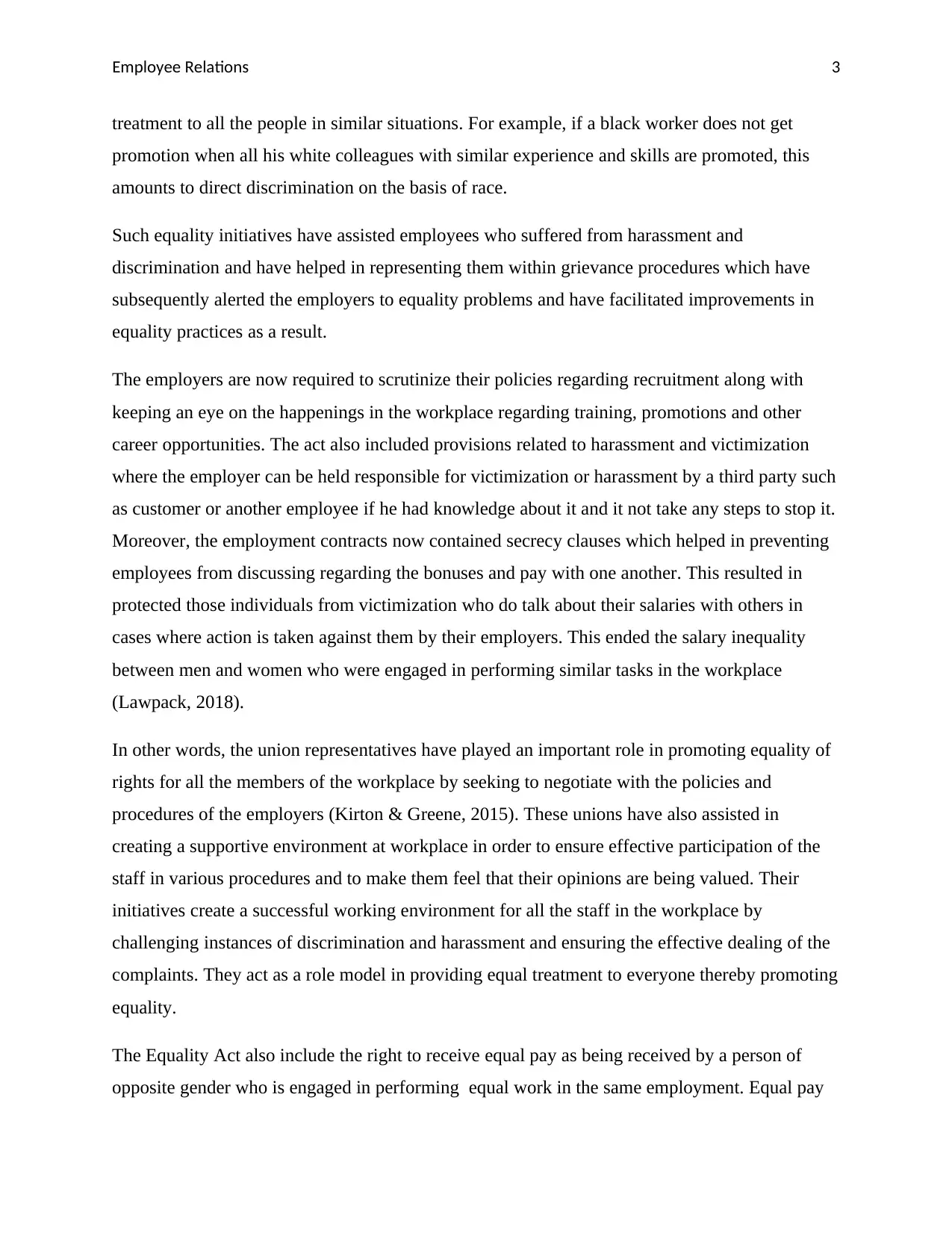
Employee Relations 3
treatment to all the people in similar situations. For example, if a black worker does not get
promotion when all his white colleagues with similar experience and skills are promoted, this
amounts to direct discrimination on the basis of race.
Such equality initiatives have assisted employees who suffered from harassment and
discrimination and have helped in representing them within grievance procedures which have
subsequently alerted the employers to equality problems and have facilitated improvements in
equality practices as a result.
The employers are now required to scrutinize their policies regarding recruitment along with
keeping an eye on the happenings in the workplace regarding training, promotions and other
career opportunities. The act also included provisions related to harassment and victimization
where the employer can be held responsible for victimization or harassment by a third party such
as customer or another employee if he had knowledge about it and it not take any steps to stop it.
Moreover, the employment contracts now contained secrecy clauses which helped in preventing
employees from discussing regarding the bonuses and pay with one another. This resulted in
protected those individuals from victimization who do talk about their salaries with others in
cases where action is taken against them by their employers. This ended the salary inequality
between men and women who were engaged in performing similar tasks in the workplace
(Lawpack, 2018).
In other words, the union representatives have played an important role in promoting equality of
rights for all the members of the workplace by seeking to negotiate with the policies and
procedures of the employers (Kirton & Greene, 2015). These unions have also assisted in
creating a supportive environment at workplace in order to ensure effective participation of the
staff in various procedures and to make them feel that their opinions are being valued. Their
initiatives create a successful working environment for all the staff in the workplace by
challenging instances of discrimination and harassment and ensuring the effective dealing of the
complaints. They act as a role model in providing equal treatment to everyone thereby promoting
equality.
The Equality Act also include the right to receive equal pay as being received by a person of
opposite gender who is engaged in performing equal work in the same employment. Equal pay
treatment to all the people in similar situations. For example, if a black worker does not get
promotion when all his white colleagues with similar experience and skills are promoted, this
amounts to direct discrimination on the basis of race.
Such equality initiatives have assisted employees who suffered from harassment and
discrimination and have helped in representing them within grievance procedures which have
subsequently alerted the employers to equality problems and have facilitated improvements in
equality practices as a result.
The employers are now required to scrutinize their policies regarding recruitment along with
keeping an eye on the happenings in the workplace regarding training, promotions and other
career opportunities. The act also included provisions related to harassment and victimization
where the employer can be held responsible for victimization or harassment by a third party such
as customer or another employee if he had knowledge about it and it not take any steps to stop it.
Moreover, the employment contracts now contained secrecy clauses which helped in preventing
employees from discussing regarding the bonuses and pay with one another. This resulted in
protected those individuals from victimization who do talk about their salaries with others in
cases where action is taken against them by their employers. This ended the salary inequality
between men and women who were engaged in performing similar tasks in the workplace
(Lawpack, 2018).
In other words, the union representatives have played an important role in promoting equality of
rights for all the members of the workplace by seeking to negotiate with the policies and
procedures of the employers (Kirton & Greene, 2015). These unions have also assisted in
creating a supportive environment at workplace in order to ensure effective participation of the
staff in various procedures and to make them feel that their opinions are being valued. Their
initiatives create a successful working environment for all the staff in the workplace by
challenging instances of discrimination and harassment and ensuring the effective dealing of the
complaints. They act as a role model in providing equal treatment to everyone thereby promoting
equality.
The Equality Act also include the right to receive equal pay as being received by a person of
opposite gender who is engaged in performing equal work in the same employment. Equal pay
Paraphrase This Document
Need a fresh take? Get an instant paraphrase of this document with our AI Paraphraser
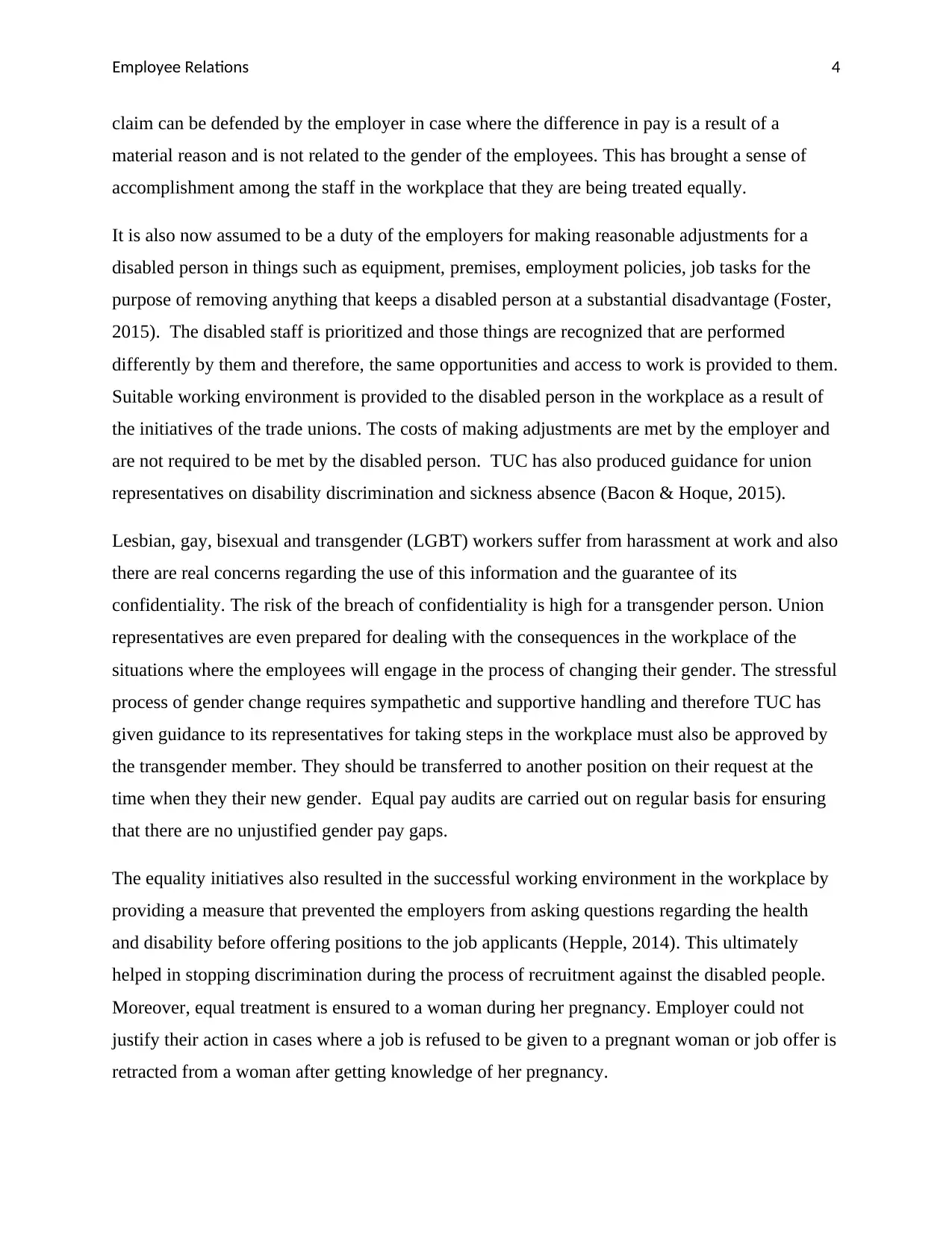
Employee Relations 4
claim can be defended by the employer in case where the difference in pay is a result of a
material reason and is not related to the gender of the employees. This has brought a sense of
accomplishment among the staff in the workplace that they are being treated equally.
It is also now assumed to be a duty of the employers for making reasonable adjustments for a
disabled person in things such as equipment, premises, employment policies, job tasks for the
purpose of removing anything that keeps a disabled person at a substantial disadvantage (Foster,
2015). The disabled staff is prioritized and those things are recognized that are performed
differently by them and therefore, the same opportunities and access to work is provided to them.
Suitable working environment is provided to the disabled person in the workplace as a result of
the initiatives of the trade unions. The costs of making adjustments are met by the employer and
are not required to be met by the disabled person. TUC has also produced guidance for union
representatives on disability discrimination and sickness absence (Bacon & Hoque, 2015).
Lesbian, gay, bisexual and transgender (LGBT) workers suffer from harassment at work and also
there are real concerns regarding the use of this information and the guarantee of its
confidentiality. The risk of the breach of confidentiality is high for a transgender person. Union
representatives are even prepared for dealing with the consequences in the workplace of the
situations where the employees will engage in the process of changing their gender. The stressful
process of gender change requires sympathetic and supportive handling and therefore TUC has
given guidance to its representatives for taking steps in the workplace must also be approved by
the transgender member. They should be transferred to another position on their request at the
time when they their new gender. Equal pay audits are carried out on regular basis for ensuring
that there are no unjustified gender pay gaps.
The equality initiatives also resulted in the successful working environment in the workplace by
providing a measure that prevented the employers from asking questions regarding the health
and disability before offering positions to the job applicants (Hepple, 2014). This ultimately
helped in stopping discrimination during the process of recruitment against the disabled people.
Moreover, equal treatment is ensured to a woman during her pregnancy. Employer could not
justify their action in cases where a job is refused to be given to a pregnant woman or job offer is
retracted from a woman after getting knowledge of her pregnancy.
claim can be defended by the employer in case where the difference in pay is a result of a
material reason and is not related to the gender of the employees. This has brought a sense of
accomplishment among the staff in the workplace that they are being treated equally.
It is also now assumed to be a duty of the employers for making reasonable adjustments for a
disabled person in things such as equipment, premises, employment policies, job tasks for the
purpose of removing anything that keeps a disabled person at a substantial disadvantage (Foster,
2015). The disabled staff is prioritized and those things are recognized that are performed
differently by them and therefore, the same opportunities and access to work is provided to them.
Suitable working environment is provided to the disabled person in the workplace as a result of
the initiatives of the trade unions. The costs of making adjustments are met by the employer and
are not required to be met by the disabled person. TUC has also produced guidance for union
representatives on disability discrimination and sickness absence (Bacon & Hoque, 2015).
Lesbian, gay, bisexual and transgender (LGBT) workers suffer from harassment at work and also
there are real concerns regarding the use of this information and the guarantee of its
confidentiality. The risk of the breach of confidentiality is high for a transgender person. Union
representatives are even prepared for dealing with the consequences in the workplace of the
situations where the employees will engage in the process of changing their gender. The stressful
process of gender change requires sympathetic and supportive handling and therefore TUC has
given guidance to its representatives for taking steps in the workplace must also be approved by
the transgender member. They should be transferred to another position on their request at the
time when they their new gender. Equal pay audits are carried out on regular basis for ensuring
that there are no unjustified gender pay gaps.
The equality initiatives also resulted in the successful working environment in the workplace by
providing a measure that prevented the employers from asking questions regarding the health
and disability before offering positions to the job applicants (Hepple, 2014). This ultimately
helped in stopping discrimination during the process of recruitment against the disabled people.
Moreover, equal treatment is ensured to a woman during her pregnancy. Employer could not
justify their action in cases where a job is refused to be given to a pregnant woman or job offer is
retracted from a woman after getting knowledge of her pregnancy.
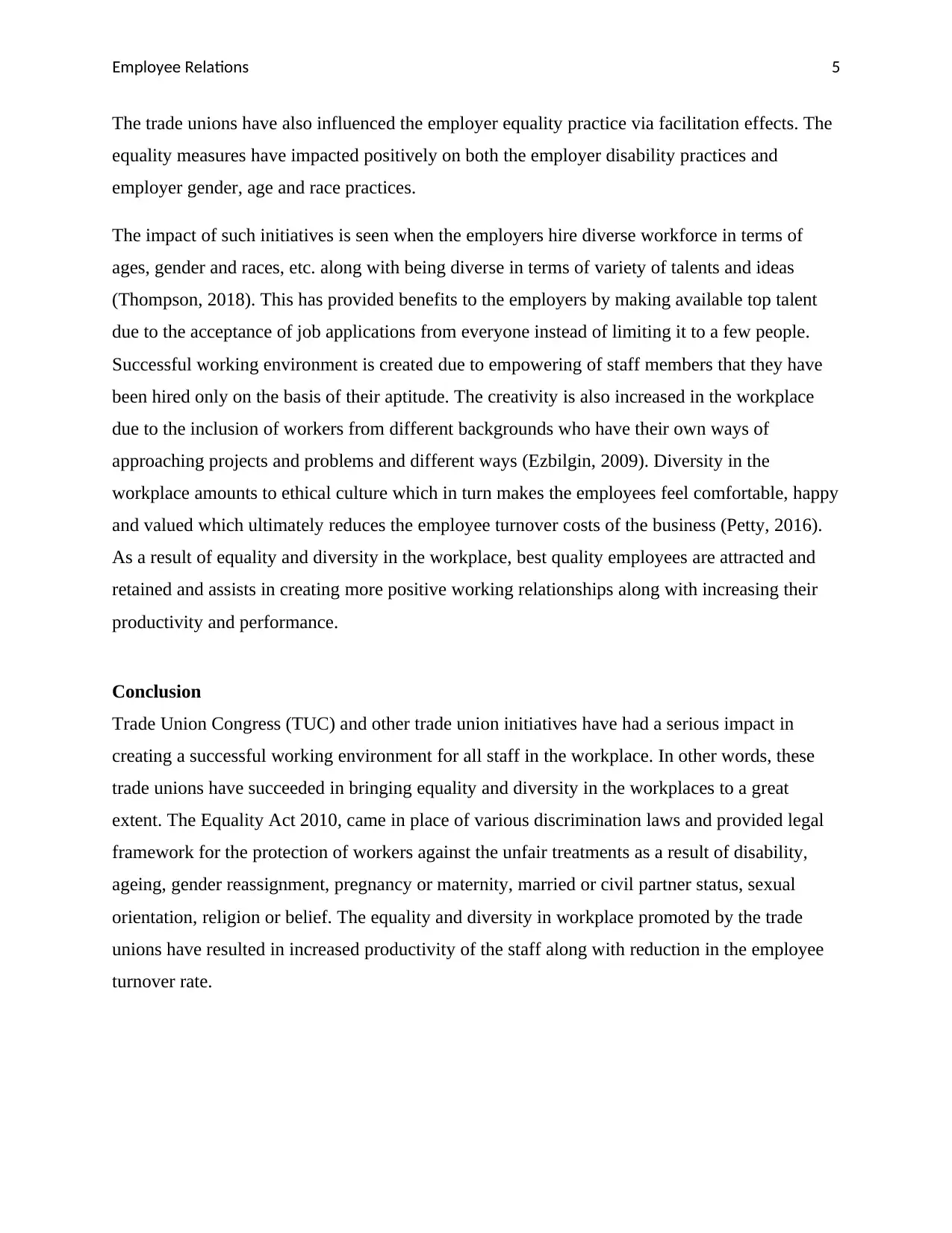
Employee Relations 5
The trade unions have also influenced the employer equality practice via facilitation effects. The
equality measures have impacted positively on both the employer disability practices and
employer gender, age and race practices.
The impact of such initiatives is seen when the employers hire diverse workforce in terms of
ages, gender and races, etc. along with being diverse in terms of variety of talents and ideas
(Thompson, 2018). This has provided benefits to the employers by making available top talent
due to the acceptance of job applications from everyone instead of limiting it to a few people.
Successful working environment is created due to empowering of staff members that they have
been hired only on the basis of their aptitude. The creativity is also increased in the workplace
due to the inclusion of workers from different backgrounds who have their own ways of
approaching projects and problems and different ways (Ezbilgin, 2009). Diversity in the
workplace amounts to ethical culture which in turn makes the employees feel comfortable, happy
and valued which ultimately reduces the employee turnover costs of the business (Petty, 2016).
As a result of equality and diversity in the workplace, best quality employees are attracted and
retained and assists in creating more positive working relationships along with increasing their
productivity and performance.
Conclusion
Trade Union Congress (TUC) and other trade union initiatives have had a serious impact in
creating a successful working environment for all staff in the workplace. In other words, these
trade unions have succeeded in bringing equality and diversity in the workplaces to a great
extent. The Equality Act 2010, came in place of various discrimination laws and provided legal
framework for the protection of workers against the unfair treatments as a result of disability,
ageing, gender reassignment, pregnancy or maternity, married or civil partner status, sexual
orientation, religion or belief. The equality and diversity in workplace promoted by the trade
unions have resulted in increased productivity of the staff along with reduction in the employee
turnover rate.
The trade unions have also influenced the employer equality practice via facilitation effects. The
equality measures have impacted positively on both the employer disability practices and
employer gender, age and race practices.
The impact of such initiatives is seen when the employers hire diverse workforce in terms of
ages, gender and races, etc. along with being diverse in terms of variety of talents and ideas
(Thompson, 2018). This has provided benefits to the employers by making available top talent
due to the acceptance of job applications from everyone instead of limiting it to a few people.
Successful working environment is created due to empowering of staff members that they have
been hired only on the basis of their aptitude. The creativity is also increased in the workplace
due to the inclusion of workers from different backgrounds who have their own ways of
approaching projects and problems and different ways (Ezbilgin, 2009). Diversity in the
workplace amounts to ethical culture which in turn makes the employees feel comfortable, happy
and valued which ultimately reduces the employee turnover costs of the business (Petty, 2016).
As a result of equality and diversity in the workplace, best quality employees are attracted and
retained and assists in creating more positive working relationships along with increasing their
productivity and performance.
Conclusion
Trade Union Congress (TUC) and other trade union initiatives have had a serious impact in
creating a successful working environment for all staff in the workplace. In other words, these
trade unions have succeeded in bringing equality and diversity in the workplaces to a great
extent. The Equality Act 2010, came in place of various discrimination laws and provided legal
framework for the protection of workers against the unfair treatments as a result of disability,
ageing, gender reassignment, pregnancy or maternity, married or civil partner status, sexual
orientation, religion or belief. The equality and diversity in workplace promoted by the trade
unions have resulted in increased productivity of the staff along with reduction in the employee
turnover rate.
⊘ This is a preview!⊘
Do you want full access?
Subscribe today to unlock all pages.

Trusted by 1+ million students worldwide
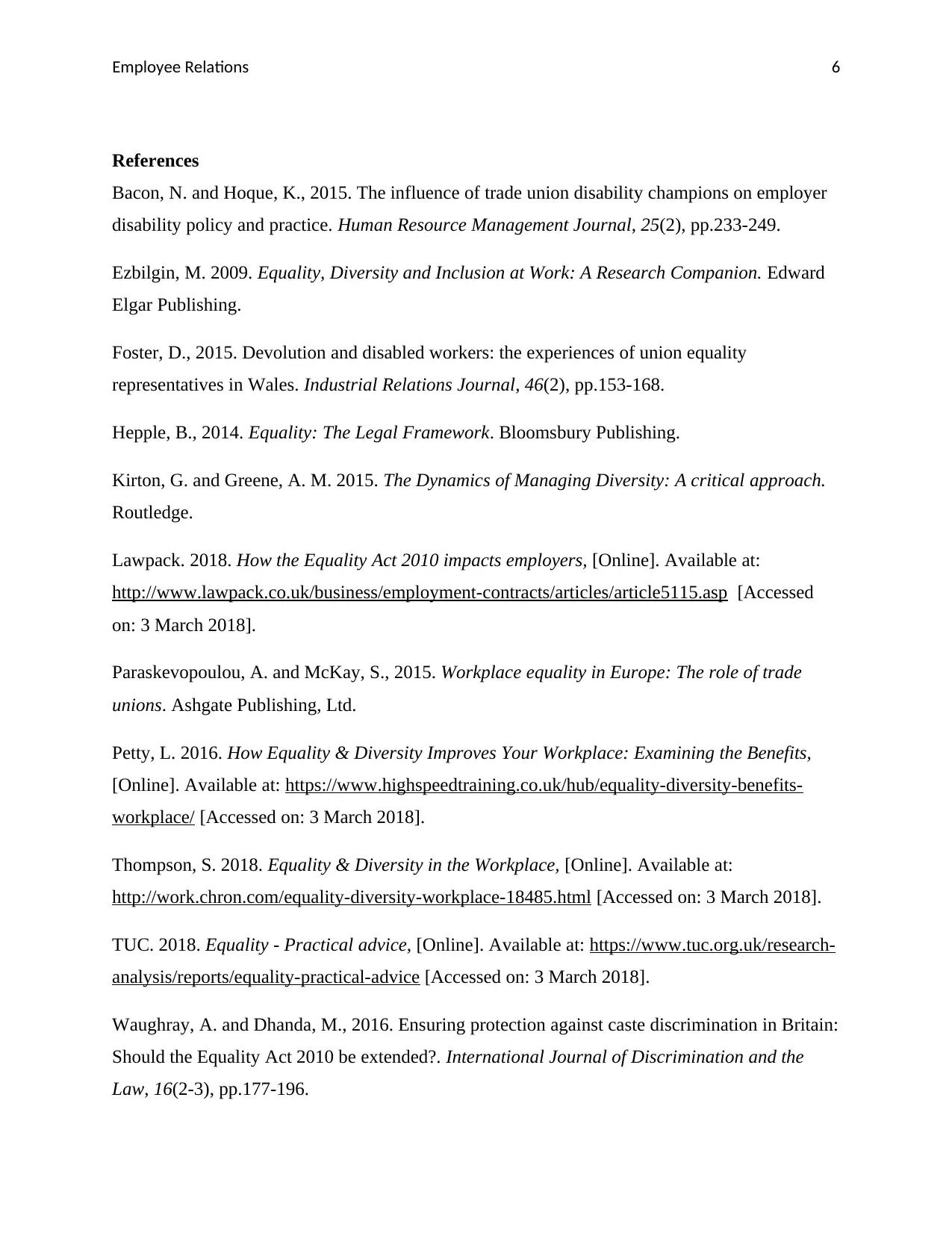
Employee Relations 6
References
Bacon, N. and Hoque, K., 2015. The influence of trade union disability champions on employer
disability policy and practice. Human Resource Management Journal, 25(2), pp.233-249.
Ezbilgin, M. 2009. Equality, Diversity and Inclusion at Work: A Research Companion. Edward
Elgar Publishing.
Foster, D., 2015. Devolution and disabled workers: the experiences of union equality
representatives in Wales. Industrial Relations Journal, 46(2), pp.153-168.
Hepple, B., 2014. Equality: The Legal Framework. Bloomsbury Publishing.
Kirton, G. and Greene, A. M. 2015. The Dynamics of Managing Diversity: A critical approach.
Routledge.
Lawpack. 2018. How the Equality Act 2010 impacts employers, [Online]. Available at:
http://www.lawpack.co.uk/business/employment-contracts/articles/article5115.asp [Accessed
on: 3 March 2018].
Paraskevopoulou, A. and McKay, S., 2015. Workplace equality in Europe: The role of trade
unions. Ashgate Publishing, Ltd.
Petty, L. 2016. How Equality & Diversity Improves Your Workplace: Examining the Benefits,
[Online]. Available at: https://www.highspeedtraining.co.uk/hub/equality-diversity-benefits-
workplace/ [Accessed on: 3 March 2018].
Thompson, S. 2018. Equality & Diversity in the Workplace, [Online]. Available at:
http://work.chron.com/equality-diversity-workplace-18485.html [Accessed on: 3 March 2018].
TUC. 2018. Equality - Practical advice, [Online]. Available at: https://www.tuc.org.uk/research-
analysis/reports/equality-practical-advice [Accessed on: 3 March 2018].
Waughray, A. and Dhanda, M., 2016. Ensuring protection against caste discrimination in Britain:
Should the Equality Act 2010 be extended?. International Journal of Discrimination and the
Law, 16(2-3), pp.177-196.
References
Bacon, N. and Hoque, K., 2015. The influence of trade union disability champions on employer
disability policy and practice. Human Resource Management Journal, 25(2), pp.233-249.
Ezbilgin, M. 2009. Equality, Diversity and Inclusion at Work: A Research Companion. Edward
Elgar Publishing.
Foster, D., 2015. Devolution and disabled workers: the experiences of union equality
representatives in Wales. Industrial Relations Journal, 46(2), pp.153-168.
Hepple, B., 2014. Equality: The Legal Framework. Bloomsbury Publishing.
Kirton, G. and Greene, A. M. 2015. The Dynamics of Managing Diversity: A critical approach.
Routledge.
Lawpack. 2018. How the Equality Act 2010 impacts employers, [Online]. Available at:
http://www.lawpack.co.uk/business/employment-contracts/articles/article5115.asp [Accessed
on: 3 March 2018].
Paraskevopoulou, A. and McKay, S., 2015. Workplace equality in Europe: The role of trade
unions. Ashgate Publishing, Ltd.
Petty, L. 2016. How Equality & Diversity Improves Your Workplace: Examining the Benefits,
[Online]. Available at: https://www.highspeedtraining.co.uk/hub/equality-diversity-benefits-
workplace/ [Accessed on: 3 March 2018].
Thompson, S. 2018. Equality & Diversity in the Workplace, [Online]. Available at:
http://work.chron.com/equality-diversity-workplace-18485.html [Accessed on: 3 March 2018].
TUC. 2018. Equality - Practical advice, [Online]. Available at: https://www.tuc.org.uk/research-
analysis/reports/equality-practical-advice [Accessed on: 3 March 2018].
Waughray, A. and Dhanda, M., 2016. Ensuring protection against caste discrimination in Britain:
Should the Equality Act 2010 be extended?. International Journal of Discrimination and the
Law, 16(2-3), pp.177-196.
Paraphrase This Document
Need a fresh take? Get an instant paraphrase of this document with our AI Paraphraser

Employee Relations 7
Wight, T. and Conley, H. 2011. Gower Handbook of Discrimination at Work. Gower Publishing,
Ltd.
Wight, T. and Conley, H. 2011. Gower Handbook of Discrimination at Work. Gower Publishing,
Ltd.
1 out of 8
Related Documents
Your All-in-One AI-Powered Toolkit for Academic Success.
+13062052269
info@desklib.com
Available 24*7 on WhatsApp / Email
![[object Object]](/_next/static/media/star-bottom.7253800d.svg)
Unlock your academic potential
Copyright © 2020–2026 A2Z Services. All Rights Reserved. Developed and managed by ZUCOL.





